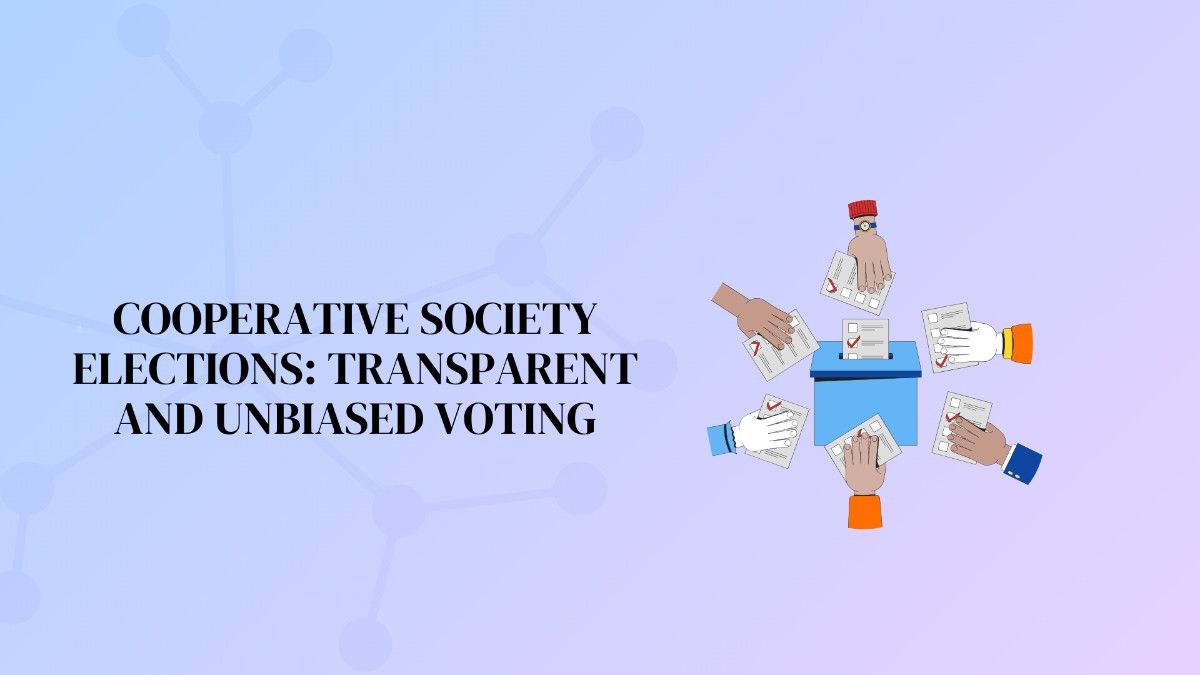Cooperative Society Elections: Transparent and Unbiased Voting
Transparent elections in cooperative housing societies: legal rules, online voting, and how to boost member participation.

Elections in housing societies—both cooperative and private—are not merely a chore. They are essential for decision-making, good governance, and fostering trust in a shared community. A clear and well-administered election decides the appropriate leaders, engages members, and builds a culture of accountability.
Whether you’re part of a government cooperative society or a private gated community, fair elections ensure smooth functioning and harmony in your neighborhood.
Common Questions Around Housing Society Elections
As the election season approaches, most committee members and residents—across all types of societies—have a few questions in common:
- What is the legal procedure of society elections?
- Can online elections exist in societies?
- Who can vote or challenge?
- What if there is an election delay?
- How do we deal with NRI or outstation voters?
- Do secure online voting systems exist?
This blog responds to these questions and offers a road map to communities—cooperative or private—that wish to conduct legal, fair, and modern elections.
Comprehending the Legal Framework
For cooperative housing societies, elections are governed by the State Cooperative Societies Acts, supported by the 97th Constitutional Amendment, which emphasizes democratic processes and regular elections.
For private housing societies or Resident Welfare Associations (RWAs), elections are typically conducted as per the bye-laws registered under the Societies Registration Act (1860) or respective state apartment ownership acts. While not all states enforce the same regulations, the fundamental principles of fairness, transparency, and member rights still apply.
Key Legal Principles for Cooperative Societies:
- Election Deadline: Must be held before the current committee’s term ends (usually 5 years).
- Authority: Conducted under the supervision of the Registrar of Cooperative Societies (RCS) or State Election Authority.
- Voter List: Must be circulated in advance to allow for review and corrections.
- Voting Process: Typically done via secret ballot.
- Penalties: Delays may lead to penalties or the appointment of an administrator.
For Private Housing Societies:
- Election guidelines are governed by the society’s registered bye-laws.
- Often, the Managing Committee or an Election Officer oversees the process.
- Online elections are encouraged, especially where in-person participation is difficult.
Regardless of society type, it’s vital to understand and follow the governing legal documents and consult with the Registrar or relevant legal counsel when in doubt.
Is Online Voting Allowed in Societies?
Yes. Online voting is increasingly recognized as legal and valid for both cooperative and private housing societies. While state laws may use the term “vote personally,” courts have interpreted this to mean that the voter must cast their own vote—not necessarily that they must be physically present.
States like Maharashtra have taken progressive steps to enable digital elections for housing societies. Private RWAs are also adopting secure online systems to simplify the process and increase participation.
Advantages of Online Voting for Societies
Whether you’re managing a cooperative housing society or a private residential community, digital elections solve many long-standing challenges:
Common Problems with Traditional Voting:
- Low turnout (especially from NRIs and working professionals)
- Logistical issues setting up polling booths
- Manual errors or manipulation
- Disputes around transparency or influence
Benefits of Online Voting:
- Convenience: Members vote from anywhere in the world.
- Fairness: Secret ballots reduce bias or pressure.
- Higher Participation: Easy access means more voters cast their ballot.
- Transparency: Votes are machine-counted and tamper-proof.
- Cost Efficiency: Saves on printing, staffing, and logistics.
Secure platforms that are STQC, MCA, or ISO-certified can ensure legal and safe digital elections. Look for features like OTP login, audit trails, encrypted voting, and anonymous results.
How to Hold Successful Society Elections
Whether for a cooperative or private society, a fair and effective election requires planning and transparency:
- Start Preparing Early
Begin 2–3 months ahead. Set a timeline for key tasks: voter list circulation, nominations, final candidate list, and voting days. - Crosscheck and Post Voter List
Share the preliminary voter list publicly and allow time for objections or corrections. - Select a Neutral Election Officer
Appoint a respected third party to supervise the election. Even online voting needs a neutral overseer. - Educate Residents and Engage Them
Use society boards, WhatsApp groups, or emails to share the election schedule and guidelines. Keep the process open and inclusive. - Use a Secure Online Platform
Choose a platform with legal compliance and security features such as encrypted ballots, OTP login, and IP tracking. - Offer Flexible Voting Times
Keep voting open for 8–24 hours to accommodate working members and outstation voters. - Encourage Participation
Send reminders, explain the stakes, and encourage voter turnout. - Explain the Process Clearly
Share how nominations work, how votes are counted, and when results will be announced. - Resolve Conflicts Professionally
Refer to your society’s bye-laws for dispute resolution. If necessary, escalate unresolved issues to the relevant Registrar or legal authority.
Molding Elections into a Positive Civic Experience
Elections in housing societies are more than administrative tasks—they are about building communities where members feel heard, respected, and represented.
A free, fair, and smooth election ensures that we have appropriate leaders. It also ensures that we have a culture where people participate and take responsibility. Now that digital voting platforms are secure and there is greater legal backing, societies now have the mechanisms to modernize their election process and open it up further—while remaining legal and fair.
Final Thoughts
If your residential society—whether government or private—is holding elections, keep this in mind:
- Know the state laws and your society’s bye-laws.
- Engage members early, openly, and consistently.
- Consider secure online voting to improve turnout and ease.
- Ensure transparency, neutrality, and fairness at all stages.
An empowered, informed, and united community starts with a fair election.
Let’s discuss the idea
Join hundreds of companies transforming their corporate communities with Almashines






